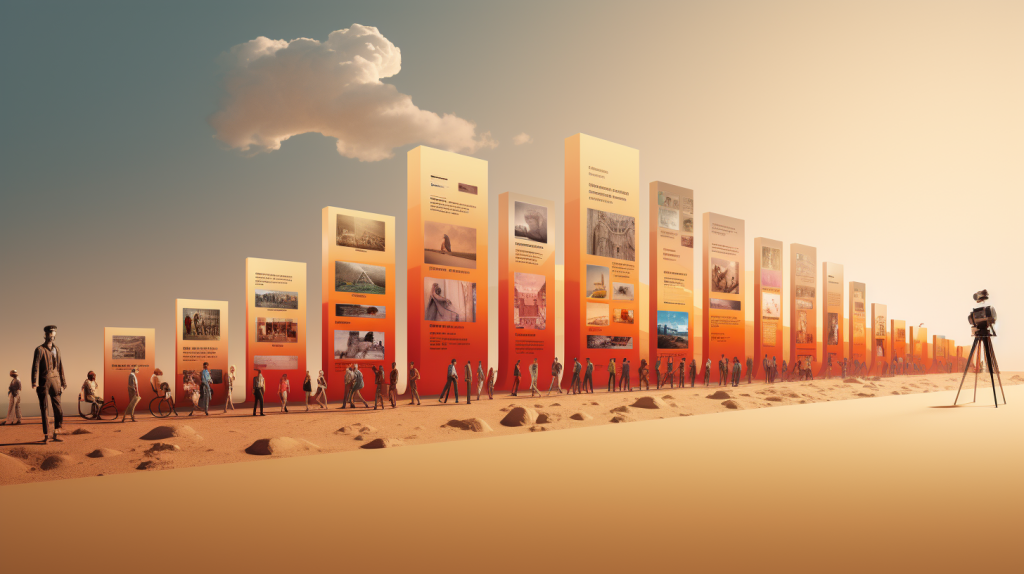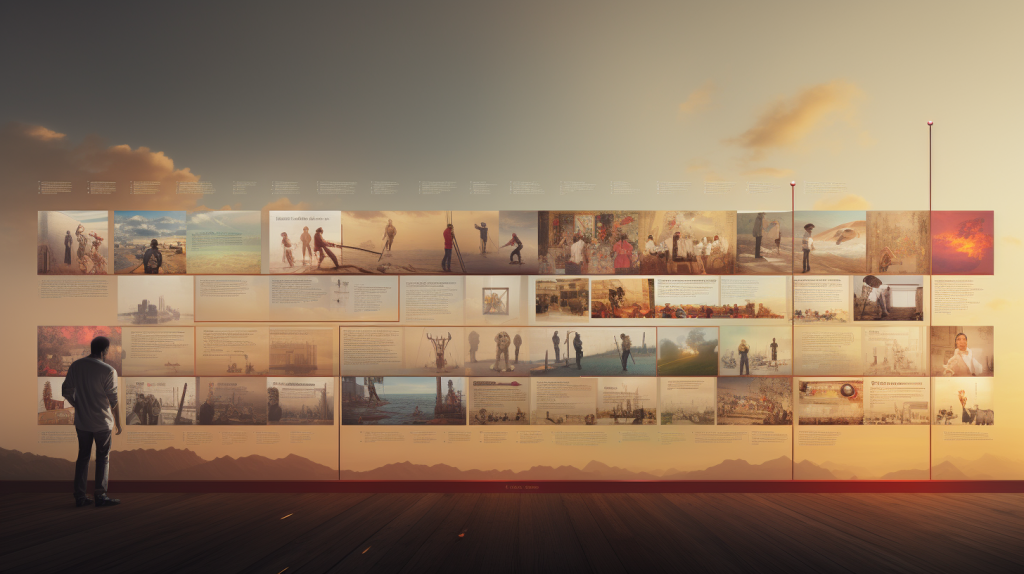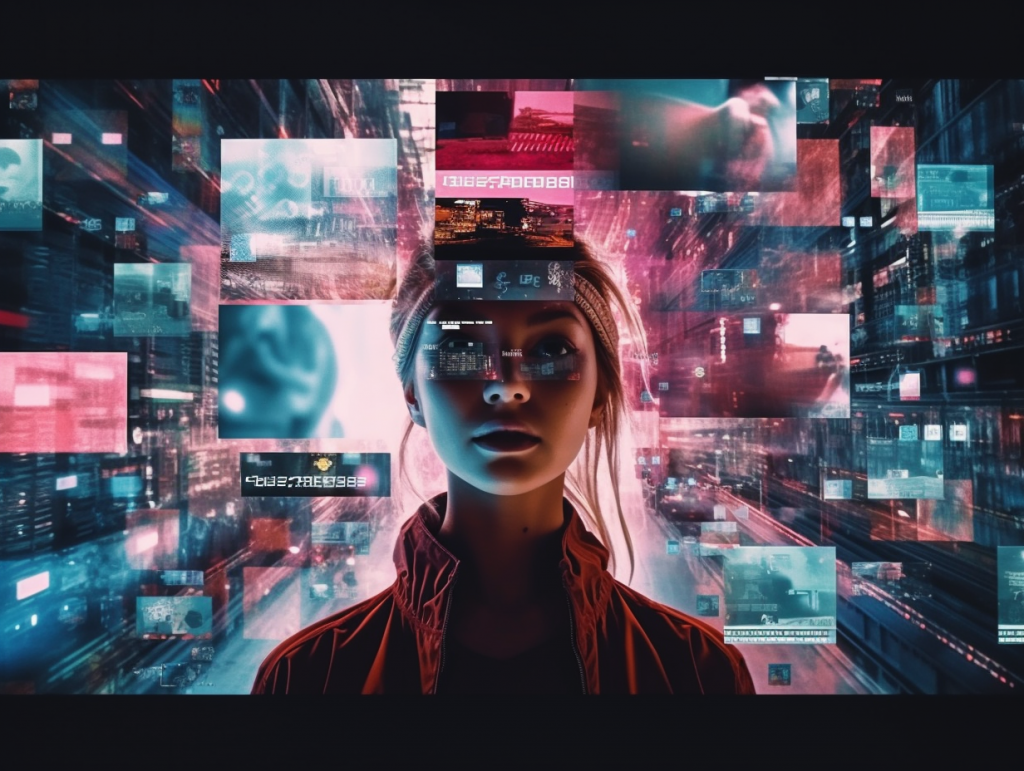Reading Time: 9 minutes

The digital age has ushered in a paradigm shift in the content production landscape. Gone are the days when crafting compelling blog posts or SEO-optimized meta descriptions was a time-consuming process. Enter the era of AI-generated content, where tools powered by machine learning and natural language processing are revolutionizing the way businesses approach content creation at scale.
For agencies and content marketers, the challenge is no longer just about generating ideas or writing engaging copy. The focus now is on leveraging AI tools to create content that not only resonates with the audience but also ranks high in search engine results. Tools such as ChatGPT, with its incredible potential to analyze human input and produce coherent and relevant content, are leading this revolution.
Whether you’re a business aiming to schedule and publish posts on social media or a content agency looking to streamline your content generation strategy, AI offers a plethora of solutions. From automating meta descriptions to providing insights for content research, AI is reshaping the content landscape, making it more efficient and dynamic.
This blog post delves deep into how you can leverage AI in your content strategy, from using tools that optimize for SEO to those that help in content research, generation, and even tone detection. We’ll also explore the various AI tools available in the market, their strengths, and how best to utilize them for your specific needs. So, whether you’re a solo content writer or a large-scale content production agency, buckle up as we embark on a journey to unlock the full potential of AI in content creation.
The Rise of AI in Content Creation

The digital landscape has witnessed transformative changes over the past few years, and one of the most profound shifts has been the integration of AI in content creation. Historically, content production was a manual endeavor, often requiring marketers to spend countless hours brainstorming, writing, and editing. With the advent of AI, this narrative is rapidly changing.
AI’s involvement in the content domain is not just about automation; it’s about enhancing the quality, relevance, and efficiency of the content being produced. Today, AI-driven tools are capable of performing detailed content research, optimizing posts for SEO, generating meta descriptions, and even crafting full-length articles tailored to a brand’s voice.
Central to this evolution is the development of Large Language Models (LLMs). These sophisticated machine learning models, equipped with natural language processing capabilities, can analyze vast amounts of information, understand context, and produce human-like text. Among the myriad of LLMs, ChatGPT stands out for its unparalleled proficiency.
ChatGPT, a product of extensive research and development, is exemplary of how far AI has come in understanding and generating content. It can be used to create blog content, optimize posts, and even generate ideas for writers experiencing a creative block. Its ability to adapt to specific tones and styles makes it an invaluable asset for businesses and content marketers aiming to produce content at scale.
In essence, the rise of AI in content creation signals a paradigm shift in the content marketing world. It’s not just about producing content faster; it’s about harnessing the power of AI to create content that is more relevant, engaging, and aligned with a brand’s strategy. As we continue to witness advancements in this field, the role of AI tools like ChatGPT will undoubtedly become even more central to modern content strategies.
Textual Content Creation with AI

In today’s digital age, creating high-quality textual content is paramount for businesses and brands. With the integration of AI tools, the process of content generation and optimization has reached new heights. Here’s a closer look at some of the game-changers in the realm of AI-powered content creation:
- DeepBrain AI: This tool is not just about textual content; it’s revolutionizing video content with its hyper-realistic AI avatars. Content creators can harness DeepBrain’s features to produce engaging video content tailored for various platforms, from YouTube to TikTok.
- Jasper.ai: For those moments when writer’s block strikes, Jasper.ai is a lifesaver. With AI-assisted writing, it offers a plethora of content ideas, helping writers craft articles, scripts, and even books. Its capabilities make it a favorite among top marketers, ensuring content is both creative and SEO-optimized.
- Rapidely: Targeting the bustling world of social media, Rapidely leverages the power of GPT-4 to produce content that resonates. Its features are specifically tailored for social media professionals, ensuring posts are not only engaging but also on-brand.
- Trellis: Amazon Seller Central is a goldmine, and Trellis makes sure sellers hit the jackpot. By integrating ChatGPT, it offers a multifaceted approach to content creation, ensuring Amazon listings are both captivating and optimized for SEO.
- AdZis: In the fast-paced world of eCommerce, product descriptions can make or break a sale. AdZis offers speedy generation of detailed and engaging product descriptions, making it a go-to tool for many eCommerce stores.
- Copysmith: When it comes to producing short-form copy that hits the mark, Copysmith stands out. From social media captions to blog intros, its range of templates and ability to adjust tone ensures content is always on point.
- Grammarly & Wordtune: No content is perfect without a thorough review, and that’s where these AI-powered grammar and style checkers come in. They not only correct mistakes but also enhance the overall flow and style of the content, ensuring it’s polished to perfection.
- Surfer SEO: Merging the worlds of content creation and SEO, Surfer SEO is a tool every content marketer needs. By offering features that ensure content is SEO-friendly, it guarantees that what’s written not only engages readers but also ranks well.
- Paragraph AI: In today’s fast-paced world, sometimes you need content on-the-fly. Paragraph AI excels at crafting quick messages with a personalized touch, making it ideal for those instant content needs, whether it’s a social media post or a quick email response.
Incorporating these AI tools into the content creation process ensures not only efficiency but also a level of quality and relevance that was previously hard to achieve. Whether it’s for SEO, social media, or eCommerce, AI is truly reshaping the landscape of textual content creation.
Visual Content Creation with AI

The digital landscape is no longer just about textual content; visual content has carved its crucial space, becoming an indispensable part of a brand’s marketing strategy. In today’s era, where every scroll, click, or swipe counts, captivating visual media is the key to grabbing attention and driving engagement.
- The Power of Visuals: Visual content, from images to videos, plays a pivotal role in how brands connect with their audience. Studies have shown that the human brain processes visuals 60,000 times faster than text. Furthermore, content with relevant images receives 94% more views than content without. In the world of SEO, where every click matters, incorporating visual elements can significantly boost a post or page’s performance. Whether it’s for social media, blog posts, or SEO-optimized product descriptions on eCommerce platforms, integrating compelling visuals is not just a recommendation—it’s a necessity.
- Midjourney: In the vast sea of visual content tools, Midjourney emerges as a beacon for those looking to create scalable images tailored to their brand’s voice. Leveraging the power of AI, Midjourney ensures that images are not just aesthetically pleasing but also resonate with the intended audience. Whether you’re a marketer, content creator, or business owner, understanding and harnessing the capabilities of Midjourney can significantly enhance your content strategy.
- DeepBrain AI: Taking visual content a notch higher, DeepBrain AI delves into the realm of video creation. With the increasing consumption of video content across platforms like YouTube, TikTok, and Instagram, having a tool that streamlines video production is invaluable. DeepBrain AI’s strength lies in its photo-realistic AI avatars, which eliminate the need for traditional filming setups. Moreover, its diverse range of video templates caters to various platforms and purposes, ensuring that brands always have the right content for the right audience.
In conclusion, as the lines between textual and visual content blur in the digital world, the importance of integrating AI tools in the content creation process becomes evident. These tools not only offer efficiency and scalability but also ensure that the content resonates, engages, and converts.
Tips for Efficiently Using AI Tools for Content
In today’s fast-paced digital ecosystem, scalable content creation has become the cornerstone for brands aiming to maintain a robust online presence. While AI tools offer unprecedented efficiencies, it’s essential to wield them effectively to ensure your brand’s voice remains authentic and resonant. Here are some tips to master the art of AI-driven content creation:
- Integrate Multiple Tools for a Comprehensive Strategy: Don’t put all your eggs in one basket. Diversify your content toolkit by integrating multiple AI solutions. For instance, while Jasper.ai might be your go-to for long-form blog posts, DeepBrain AI can be pivotal for video content, and Midjourney can handle your image needs. By leveraging a suite of tools, you ensure a comprehensive and scalable content creation strategy that covers all bases.
- Maintain Brand Voice and Authenticity: One of the concerns with AI-generated content is the potential loss of a brand’s unique voice. To counteract this, always review and refine the output from these tools. Use them as a foundation and then layer in your brand’s tone, style, and nuances. Remember, while AI can generate content, it’s the human touch that infuses authenticity and relatability.
- Continuous Learning and Staying Updated: The world of AI is ever-evolving. New features, improved algorithms, and enhanced capabilities are continuously being rolled out. Stay abreast of these developments. Subscribe to updates from your chosen tools, participate in webinars, and engage in communities. This proactive approach ensures you’re always leveraging the latest and most efficient features for scalable content creation.
- Test, Analyze, Refine: AI tools, especially in content creation, are only as good as the feedback they receive. Regularly analyze the performance of your AI-generated content. Which posts are engaging your audience? Which videos have the highest retention? Use this data to refine your AI tool’s parameters, ensuring even better results in the future.
In essence, while AI tools offer a powerful avenue for scalable content creation, their true potential is unlocked when used strategically, ensuring content remains authentic, engaging, and reflective of a brand’s unique voice.
The Future of AI in Scalable Content Creation

The fusion of AI and content creation has opened doors to efficiencies and capabilities previously deemed futuristic. However, as we stand on the cusp of further AI advancements, it’s crucial to speculate on the trajectory of this synergy. Here’s a look into what the future might hold:
- Predictions and Trends to Watch Out For:
- Hyper-Personalization: With AI’s ability to analyze vast amounts of data, we can expect content to be tailored to individual user preferences, enhancing user experience and engagement.
- Multilingual and Multi-regional Content: AI tools, with their advanced natural language processing capabilities, will make it easier to produce content tailored to different languages and cultures, expanding a brand’s global reach.
- Interactive Content: As AI becomes more integrated with other tech trends like augmented reality (AR) and virtual reality (VR), we might see a rise in interactive, immersive content experiences.
- Voice and Visual Search Optimization: As voice search becomes more prevalent and visual search gains traction, AI will play a pivotal role in optimizing content for these new search modalities.
- Real-time Content Adaptation: AI might soon adapt content in real-time based on users’ interactions, behavior, and feedback, ensuring content remains relevant and engaging.
- Balancing Human Creativity with AI Efficiency: While AI offers unparalleled efficiencies in content generation and optimization, the essence of storytelling and human connection remains irreplaceable. The future will likely see a balanced approach where AI aids the content creation process, but human creativity remains at the helm. Think of AI as the brush and paints, while the human mind remains the artist, guiding the narrative and ensuring emotional resonance.

The horizon of AI in scalable content creation is expansive and promising. As brands and content creators, staying updated with these trends and ensuring a harmonious blend of human creativity and AI efficiency will be key to staying relevant and impactful in the evolving digital landscape.
As we navigate the digital age, the significance of scalable content creation cannot be understated. In an era marked by information overload and rapidly shifting consumer preferences, the ability to produce high-quality content at scale becomes a competitive advantage. Scalable content not only allows brands to stay relevant across various platforms and audiences but also ensures they can quickly adapt to emerging trends and market dynamics.
For businesses, the evolution of AI tools in the content landscape offers a golden opportunity. These tools, ranging from textual generators to visual content creators, provide a means to produce content efficiently without compromising on quality or authenticity. Yet, like any tool, their true potential is unlocked only when wielded with strategy and insight.
To those hesitant about integrating AI into their content strategies, consider this a gentle nudge of encouragement: the digital landscape is ever-evolving, and those who adapt, innovate, and experiment are often the ones who lead the way. Embracing AI tools for content creation is not about replacing human creativity but augmenting it, making the process more streamlined and the output more impactful.

